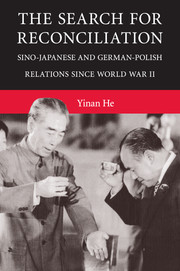Book contents
- Frontmatter
- Contents
- Tables and Illustrations
- Acknowledgments
- List of Abbreviations
- List of Postwar Japanese Prime Ministers and (West) German Chancellors
- Chronology
- Introduction
- 1 Explaining Deep Interstate Reconciliation
- 2 When East Meets West: Postwar German-Polish Reconciliation
- 3 Initial Isolation: Pre-Normalization Sino-Japanese Relations
- 4 The “Honeymoon” Period: Sino-Japanese Relations, 1972–1981
- 5 An Old Feud Comes Back: Sino-Japanese Relations in the 1980s
- 6 Volatility and Downward Spiral: Sino-Japanese Relations from the 1990s to the Present
- Conclusion
- Appendix
- Bibliography
- Index
6 - Volatility and Downward Spiral: Sino-Japanese Relations from the 1990s to the Present
Published online by Cambridge University Press: 04 August 2010
- Frontmatter
- Contents
- Tables and Illustrations
- Acknowledgments
- List of Abbreviations
- List of Postwar Japanese Prime Ministers and (West) German Chancellors
- Chronology
- Introduction
- 1 Explaining Deep Interstate Reconciliation
- 2 When East Meets West: Postwar German-Polish Reconciliation
- 3 Initial Isolation: Pre-Normalization Sino-Japanese Relations
- 4 The “Honeymoon” Period: Sino-Japanese Relations, 1972–1981
- 5 An Old Feud Comes Back: Sino-Japanese Relations in the 1980s
- 6 Volatility and Downward Spiral: Sino-Japanese Relations from the 1990s to the Present
- Conclusion
- Appendix
- Bibliography
- Index
Summary
Sino-Japanese relations enjoyed temporary serenity in the early 1990s only to deteriorate again from the mid-1990s, marked by renewed sovereignty disputes over Taiwan, offshore islands, and maritime rights, and the politicization of Japanese aid policy to China as well as a downward spiral in popular image. So the relationship stagnated at the shallow reconciliation–friction stage. Structural conditions correctly predict the increased bilateral tension resulting from the end of the Cold War. What remains unexplained is the four- to five-year time lag between the dissipation of the common Soviet threat at the end of the 1980s and the sharp increase of Sino-Japanese tension in the mid-1990s. Also, realist theory only partially explains the intensity of the bilateral friction and alienation during this period because a major shift in the Sino-Japanese balance of power was lacking, and none of their political and economic disputes involved vital national interests.
Historical memory provides a strong explanation for the temporary harmony in the early 1990s as well as for the escalation of bilateral tension four to five years later. From the 1990s, Japan's conservative ruling elites perpetuated old national myths not only to justify an assertive diplomatic agenda but also to use the memory tool to mobilize public support for their electoral strategy and domestic reform programs. In the meantime, the goals of enhancing internal cohesion and boosting regime legitimacy motivated the Chinese government to employ a twofold strategy of launching a patriotic history education campaign at home and attacking Japan's attitude toward history in the diplomatic arena.
- Type
- Chapter
- Information
- The Search for ReconciliationSino-Japanese and German-Polish Relations since World War II, pp. 234 - 288Publisher: Cambridge University PressPrint publication year: 2009



